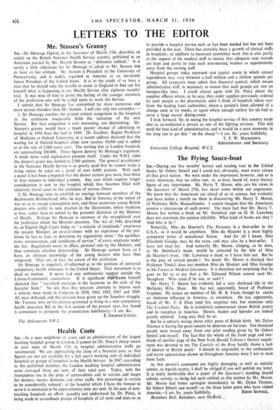LETTERS TO THE EDITOR
Mr. Stassen's Granny
SIR,—Sir Heneage Ogilvie, in the Spectator of March 17th, describes an article on the British National Health Service recently published in an American journal by Mr. Harold Stassen as "dishonest rubbish." It is surely a little ridiculous for Sir Heneage to adopt to Mr. Stassen this de haul en bas attitude. Mr. Stassen is President of the University of Pennsylvania, and is widely regarded in America as an inevitable future President of the United States. It is to the credit of so busy a man that he should take the trouble to come to England to find out for himself what is happening in our Health Service after eighteen months' trial. It was wise of him to probe the feeling of the younger members of the profession who will be called upon to work the Service.
1 submit that Sir Heneage has committed far more numerous and more serious blunders than Mr. Stassen. I will cite only two examples:-
1. Sir Heneage ascribes the present, critical congestion in the hospitals to the confusion inseparable freirn the initiation of the new Service. But that congestion is ever increasing, not diminishing. Mr. Stassen's granny would have a much poorer chance of admissiop to hospital in 1950 than she had in 1949. Dr. Gardner, Regius Professor of Medicine at Oxford University, in a recent address declared that the waiting list in Oxford hospitals alone now reaches 10,000 and is added to at the rate of 2,000 every year. The waiting lists at London hospitals are approaching 100,000. These figures destroy Sir Heneage's argument. A much more valid explanation presents itself. Under the N.H.I. rules the doctor's panel was limited to 2,500 patients. The general practitioner in the National Health Service is so poorly paid that he cannot make a living unless he takes on a panel of over 4,000 patients. With such a panel it has been computed that the doctor cannot give more than three to four minutes to individual patients. Any case which requires longer consideration is sent to the hospital, which thus becomes filled with relatively trivial cases to the exclusion of serious illness.
2. Sir Heneage tries to establish an analogy between members of the Buchmanite Brotherhood, who, he says, fled to America at the outset of war so as to escape conscription here, and those numerous young British doctors who prefer to seek practice in the Dominions, where medicine is free, rather than to submit to the personal dictation of the Minister of Health. Perhaps Sir Heneage is unaware of the stranglehold over the profession which the Minister exercises. The Act of 1946, described by an English High Court Judge as " a miracle of ineptitude," empowers the present Minister, an ex-coal-miner with no experience of the pro- blems he has to face, to determine by regulations alone " the qualifica- tions, remuneration, and conditions of service " of every employee under the Act. Regulations mean, in effect, personal rule by the Minister, and thus constitute absolute dictatorship. Sir Heneage cannot have, as I have, an intimate knowledge of the young doctors who have thus emigrated. They are, in fact, the cream of the profession.
Sir Heneage is singularly ill-informed as to the position of universal compulsory health insurance in the United States. That movement is as
dead as mutton. It never had any enthusiastic support eoutside the
Labour-Communist associations. It is significant t nin himself declared that " socialised medicine is the keystone to the arch of the Socialist State." No less than five separate attempts to impose such a scheme were made in Congress in 1939, 1943, 1945, 1947 and 1949. All were defeated, and the sponsors have given up the hopeless struggle. Mr. Truman, who on his election promised to bring in a new compulsory health insurance Bill in the first session of the present year, has found it convenient to postpone the presentation indefinitely.—I am, &c., E. GRAHAM-LITTLE. The Athenaeum. S.W.I.






































 Previous page
Previous page